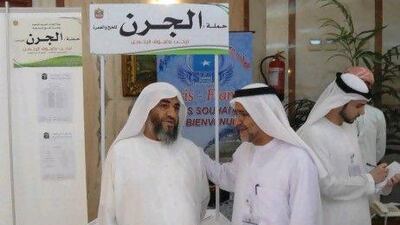Shopkeepers in the UAE are kept on their toes by surprise visits by health inspectors, and it is no different for the agencies supplying meat and vegetables to those like Haneen Dajani who are performing the Haj this year
Half of the meat inside the freezer was uncovered and the temperature wasn't cold enough, noted a Haj food inspector, as he examined an agency's kitchen.
"If he said he will cook the meat today then it's fine, but it cannot stay in this condition," said Tarek Al Braiki, a member of the UAE Haj commission.
Mr Al Braiki was part of an inspection committee examining quality of services provided to UAE pilgrims; the committee included a religious adviser, a member of the Abu Dhabi Food Control Authority, a doctor, a volunteer and two regular Islamic Authority general inspectors.
"We brought it at 2pm [three hours earlier] it hasn't had time to freeze yet," replied the agency's chef.
Mr Al Braiki continued his tour around the cooking area which was on the hotel's roof and checked the vegetables in boxes, and yoghurt cans on the floor.
"Those were brought in today?"
The chef assured him they were.
Thirty minutes earlier the Mr Al Braiki complained about piled-up food, an uncovered rubbish bin, and an inefficient electric fly zapper at another agency's kitchen.
"This should be changed, the [zapper] cage should extend from corner to corner."
A strong barbecue smell circulated in the kitchen as beef sizzled on the stove.
The kitchen seemed a bit spotted with food crumbs and splashes around the cooking area, which the inspector considered normal considering the amount of food being prepared.
As for the other faults found, the agency owner said he would fix them in three days.
"He has only a 24 hour chance to fix them, or else we will take action," said Ahmed Hussein, the authority's inspector. "We will re-visit him in the morning and again in the afternoon, we will keep following up until they respond to our comments."
The following day's visit will be a surprise without prior notification.
On a brighter side, two veteran pilgrims praised the agency as the best they have tried.
They relaxed in their bedroom as the committee entered to inspect it. "The services are worth more than what we paid for," said Rashid Al Naqbi, a 45-year-old Emirati.
"If there were any defaults why wouldn't we say, we paid money for the service after all," he added.
The company was also praised for the banners at the hotel reception carrying its name, details and some useful information.
"This way if a pilgrim was lost he can see the signs and know he reached the right place," explained Mr Hussein.
The hotel's lobby and lifts flooded with the pilgrims who had arrived early morning.
While some listened to a lecture in French at the lunchroom, others gathered to pray at the lobby, while some searched for the medical clinic.
"The location of the clinic should be changed," said the committee's doctor.
It was in a tiny corner at the hotel's lobby surrounded by partitions with nothing much more than a bed, closet, and desk.
"There is no privacy for the patients, anyone sitting in the lobby can hear what the patient is saying, what if it was a woman and she was giving private information about her case," he explained.
The agency argued that this place was allocated to them by the hotel and they cannot be provided by a substitute.
"I will explain the situation to the mission's medical board and will see what they decide," concluded the doctor.
The mission's inspection teams will be performing visits daily as more pilgrims start to arrive.


